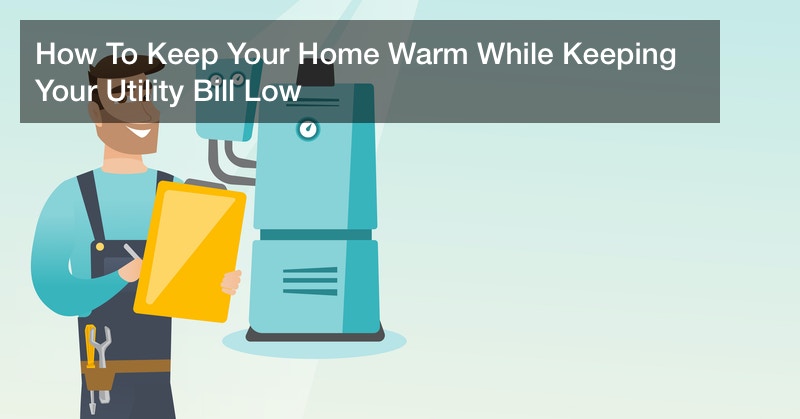
Winter is the time of year when home utility bills begin to soar. Even though summer can present a major challenge to controlling your utility bill, winter is not much different. Most of America will turn colder, which will drive people indoors to crank up the heater.
While it will feel cozier in the home, it will also drive your heating bill up at a time when controlling expenses is very important. The average American household is $117,951 in debt, and that price alone is enough to make some folks think about conserving their electricity costs.
Thankfully, there are many ways that you can keep your home warm while not allow your heating bill to shot up, from humidifying your home to making sure it’s perfectly insulated so the heat won’t escape. The ways for you to keep your home warm while also keeping your utility bill low are numerous, and here are some tips that you can use to ensure that your utility bill won’t be a headache this winter.
Make Sure Your Heater Is Working Properly

Before the winter, you should make sure that your heating system is in working order to handle the rigors of the chilly season.
A company specializing in heating services can assess whether or not your heater is working the way it should. Once the unit has been checked, proper repairs can be made so that your heating unit won’t be a liability to your wallet this season and will keep your home warm and cozy.
Thermostats Matter

Your thermostat truly holds a big key in controlling your utility bill costs.
To keep your heating bill in line, set your thermostat between seven-and-10 degrees lower for nearly most of the day. If you have a thermostat that you can program to cut on-and-off at a certain temperature, that would be even better.
If your home has a heat pump, the situation changes a bit. Lowering the temperature in your home with a heat pump could cause your residential heating unit to be less efficient, resulting in bigger heating bills.
Instead of lowering your thermostat to the seven-to-10 degree threshold like you would do with a programmable thermostat, only do one-to-two degrees to ensure your heating system is working efficiently and not putting a load on your electrical system.
If you’re having an issue with your heating pump system, get in touch with a residential heating system repair specialist to see what the issue could be and have it repair it.
If You Don’t Have a Programmable Thermostat, Get One

A programmable thermostat is a great way to manage the mercury in your home.
These types of thermostats can control your heating unit to cut on and off at certain temperatures. Doing this will reduce the likelihood of you having to turn your unit on-and-off manually, as the thermostat will simply do that job for you.
A general rule of thumb is to set the temperature at certain times of the day. Set your thermostat to a comfortable reading so that not only will your home stay warm, but you can better achieve savings with your utility bill.
Mind the Gaps in the Home

If you live in a city with a metro subway or light rail line, you will usually find a sign that says “Mind the Gaps.”
That same logic also applies to your home for the winter as gaps in your home can allow heat to escape. See if there are gaps that may need to be fixed and use spray foam to seal up those gaps. Making sure your home isn’t losing heat will save your money on your light bill.
It is also very important to have your roof checked. Along with any gaps in the home, have a roof repair company come in to make sure there aren’t any structural issues that could cause heat to leave your home. Getting a roofing service to come and check out the roof will certainly save you a lot of money during the winter.
Check Your Doors
One of the main spots where outside air can seep into your home is through the bottom of exterior doors.
Stopping these cold drafts from getting into your home should be a top priority if you aim to save money. You can stop the drafts from coming in by installing door sweeps. You can find door sweeps either at a home improvement store or seek out residential heating companies to help install them.
Check And Seal Up Heat Ducts
While you’re making sure that everything in your home is sealed up from the incoming cold, don’t overlook your heating ducts.
You can find heating ducts in your attic, and you will need to head up there to see if there are any holes or tears in the ducts. Air duct sealing services can fix the damage so that heat won’t leak out from the ducts.
Make Sure Your Basement Is Insulated
While you’re in the attic making sure your heating ducts are ready to go, head downstairs to take a good look at your basement.
One of the major reasons heat can seep out of homes during the winter is due to an uninsulated basement. According to HouseLogic, basements left uninsulated can cost you as much as $170 per year in heating costs.
Losing that much money on heating can cause some pain in your wallet, which is why you should contact a residential heating service to make the needed insulation repairs to keep that $170 in your pocket.
Put In Storm Windows
For people living in colder climates, switching up your windows can make a huge difference in your utility bills.
Consider installing storm windows that will put in an extra layer of glass between the inside and outside of your home. Install storm windows if you live in an older home that doesn’t have the same type of ventilation as newer homes. With storm windows, you’ll have an extra layer of protection that can keep heat from seeping out of the house and lessen the need to turn up your thermostat.
Insulate Your Water Heater
The water heater plays a huge part in making sure you have warm water for the winter.
Call a plumber to check and see if there’s anything wrong with your water heater. If you have an old one, wrap an insulation jacket around the pipes to keep the heat from leaking out. Also, keep the hot water pipes outside from freezing by covering them up as well. This simple tip will keep warm water flowing into your faucet in the winter, and reduce the likelihood of your pipes needing plumbing repairs in the future.
Reduce Your Electricity Consumption
The general rule of thumb is that using less electricity will keep your utility bills lower.
If you’re not using the light in one room, turn it off. If you’re not watching TV, turn off your television. Watching your electricity consumption can make a difference in what your bill will look like once it is mailed to you.
To save even more on your utility bill, invest in a power strip that can hook up multiple devices. These strips come with an on/off switch that can shut off multiple devices with just one click, saving you the time of having to turn off each device manually.
Even when your devices are not on, it can still suck in power. Some devices you should leave plugged in, like your television. However, devices that you don’t use all day, such as a coffee maker, should be unplugged so that those devices won’t have the chance to run up your utility bill.
Make Sure Electric Plugs Are Inslulated
Your electrical plugs may seem like something that you would overlook while insulating your home for the winter, but that is an area you should pay close attention to.
According to The Portland Press Herald, your electrical outlets can be a source for air leaks due to holes in the wall that is behind an outlet’s base plate. To secure the outlets so that air won’t leak from them, insulate them with a premade foam gasket that can go right into the outlet.
You can also contact an electrician to come in and make sure your electrical plugs are insulated and ready for the winter.
Switch Up Those Light Bulbs And Appliances
Replacing inefficient lightbulbs and household appliances can make all the difference in keeping the utility bill down in your home.
If you’re buying brand new appliances, make sure that the new ones you’re purchasing are efficient on energy. This will lead to big savings on your utility bill as your new, efficient appliances won’t use up as much energy as your old ones. Also, buy efficient light bulbs that won’t suck up so much energy, with LED lightbulbs being some of the best money savers.
Don’t just choose any LED lightbulb, though. Make sure that the bulbs you’re buying are the right ones and put them in places where they will make a difference. LED and other energy-efficient lightbulbs can make a big dent in those electricity bills.
Rotate Those Ceiling Fans
Most people think of ceiling fans as a way to help cool down a home in the summertime, but did you know that you can also use your ceiling fan to help keep your home warm during the winter? Well, you sure can, and there’s an easy way to achieve it.
All you have to do is change the setting on your fan to rotate in the opposite direction and keep your fan speed low. What this will do is pull the cooler air up and push the warmer air downward. Doing this will help keep your home nice and warm and will also help alleviate pressure from your heating unit.
By keeping your home warm, your ceiling fan can be one of the main ways to keeping your utility bills low during the winter.
Make Sure Your Furnace Is Cleaned Out
While most newer homes have programmable thermostats to control the heating, some older homes still rely on a furnace to keep homes warm and cozy.
If your home still has a furnace, then you should make sure it’s cleaned out before you use it for the winter. Make sure that your furnace and vents are checked out and cleaned out by an HVAC service. Make sure the furnace filters are also cleaned out so that it can keep your home warm while keeping your expenses low.
A Warm House Is a Friendly House
Winter is a time when humidity can be your friend when it comes to saving money.
While you’re heating your home, the air within your humble abode can become drier. This dry air can evaporate heat, leading to your heater staying on longer and your utility bill rising. Keeping your house humid will hold the heat in your home better and will also warm it up faster.
Now is a great time to invest in a humidifier that will keep your home warmer. Even with the temperatures lower, a humidifier can enhance the warmth in your home, which will, in turn, add up to big savings in your wallet.
Only Keep The Rooms You Use Heated
We all love to keep our entire home warm, but that also carries the possibility of high electric bills.
To make sure your light bill isn’t sky-high, don’t heat rooms that you don’t use regularly. An example of this is your kitchen or the dining room. These two rooms don’t need to be heated regularly as, say, your living room or bedroom.
Conservation is the key here, and conserving your heat to the rooms you use regularly will save you some money on your electric bill when it comes due.
By following these simple steps, you can assure that your home doesn’t become a burden on your wallet when Old Man Winter rolls around.
Make sure your home is insulation so the heat doesn’t leak out nor cold air can make it into the home. Turn your ceiling fans counter-clockwise and invest in a humidifier to keep your home warm. Make sure to contact professionals who can give your home a look-over to see if your house is efficient from the cold.
Doing these simple things will make your wallet happier, and a happy wallet always makes for a happy life.



